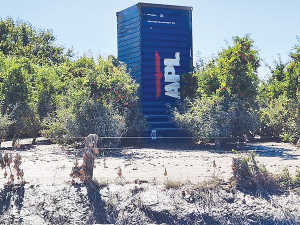No surprises, the Hawke's Bay horticulture sector needs a huge injection of additional cash - at least $410 million - if it's to recover from where it was before Cyclone Gabrielle struck in 2023.
A report by the Boston Consulting Group (BCG) which was done pro bono says the short-term, critical response to the cyclone was a success, thanks to a timely joint response between the public and private sectors. But it goes on to say that at least $345 million more is needed for replanting and reinstatement, and $65 million more for on-orchard clean up.
BCG New Zealand managing director and partner Phillip Benedetti says Hawke's Bay growers are still facing extremely tough economic conditions a year on from Cyclone Gabrielle.
He says growers are facing tightening margins with increasing production costs and challenges that were exacerbated by Gabrielle's impact on harvests and infrastructure.
"The horticulture sector is struggling to attract and retain talent, with young people leaving the sector and the region. Limited funding for horticulture education further adds to this challenge, and with the cyclone worsening business prospects in Hawke's Bay horticulture, the sector could lose even more talent," he says.
Benedetti says to strengthen the horticulture sector and achieve long-term resilience, there needs to be targeted support for those most in need, investment in replanting and orchard-based technologies, and the long-term risks posed by climate change need to be addressed.
"Continued collaboration between the government and the private sector is essential to ensure the long-term sustainability and growth of the Hawke's Bay horticultural sector," he says.
The report confirms what growers have told Rural News in the past - pointing out that it may take a generation or more for some orchards to fully recover. Some have suggested that they may have to completely financiall restructure their businesses because of the cost of re-establishing their orchards. The problem being, as one orchardist said, that it takes seven years from planting new trees to getting a commercial crop - leaving a financial hole in that period.
Apples and Pears New Zealand chief executive Karen Morrish says BCG's report confirmed what the industry body is hearing anecdotally that apple and pear growers in Hawke's Bay continue to struggle in the wake of Gabrielle.
She says the cyclone hit at a time when the industry was already facing pressure on profitability due to inflation, and replanting orchard blocks requires significant time and money.
"Replanting also requires water and right now, many of our growers are facing significantly reduced water allocations from the Hawke's Bay Regional Council. Also, we have other growers who have the funds to invest and develop new blocks but can't find land with the appropriate water consents," she says.
Morrish says growers are critical to the Hawke's Bay community and are deeply enmeshed, with their lives and families here.
She says they don't want to take unnecessarily from the environment, however for them to reestablish what was lost, they must be provided the right environment to work within and currently, this is not the case.



















